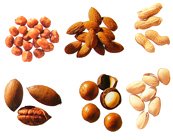Nuts nutrition facts

|
| Delicious nuts! |
Enhance your daily nutritional intake with the goodness of nuts!
Simply enjoy a daily handful of edible nuts, such as almonds, or your preferred wholesome seeds like sesame, and you'll find yourself not only happier but also on the path to better health and fitness.
Nuts offer a comprehensive package of benefits. They are a rich source of energy, protein, antioxidants, vitamins, minerals, and the much-discussed omega-3 fatty acids. These crunchy yet buttery delights are truly delightful gifts from Mother Nature to humanity.
Here is an impressive list of kernels and seeds with detailed illustrations of their health benefits and nutrition facts:
Nuts are companionable!
- You can carry them along with you wherever you go!
- There is no need for special containers or carry boxes.
- They have a long shelf life. Unlike fruits and vegetables, nuts are not easily perishable!
- You can enjoy them whenever you like! Wherever you want! Without the worry about preparation, in fact, nuts and seeds hardly need a kitchen helper!
Nuts indeed make for great companions, thanks to their convenience and longevity. They're a versatile and nutritious snack option that can be enjoyed on the go without the need for elaborate preparation or special containers. Plus, their extended shelf life makes them a practical choice for those looking for a healthy and satisfying snack option.
Nuts and kernels are amiable! Nearly all the types of nuts and seeds we consume are naturally enclosed in protective shells. You don't need to be overly concerned about contamination or handling problems. Simply pick the wholesome-looking nuts you prefer and savor them!
The Importance of Nuts in Your Diet
Discover the Why and How
Nuts and seeds are packed with energy and essential nutrients. They are particularly rich in health-friendly monounsaturated fatty acids (MUFA) like oleic and palmitoleic acids.
These MUFAs play a crucial role in lowering LDL or "bad cholesterol" and increasing HDL or "good cholesterol" levels in your blood. Research indicates that a Mediterranean-style diet, which is abundant in MUFAs, can help reduce the risk of coronary artery disease and stroke by promoting a healthy lipid profile in your blood.
Nuts and seeds are also abundant sources of omega-3 essential fatty acids, including Linoleic acid, α-Linolenic acid (ALA), Eicosapentaenoic acid, and Docosahexaenoic acid. Studies suggest that these omega-3 fats have anti-inflammatory properties, which can help lower the risk of conditions such as hypertension, coronary artery disease, strokes, and certain types of cancers, including breast, colon, and prostate cancer.
Omega-3 fatty acids also offer potential benefits in conditions like rheumatoid arthritis, schizophrenia, depression, and Alzheimer's disease.
In addition to healthy fats, nuts and seeds are rich in polyphenolic flavonoid antioxidants such as carotenes, resveratrol, lutein, and cryptoxanthin. These compounds provide protection against various health issues, including cancer, heart disease, degenerative nerve diseases, Alzheimer's disease, and viral/fungal infections. Notably, resveratrol in peanuts can reduce stroke risk by modulating molecular mechanisms in blood vessels, making them less prone to damage and promoting the production of the vasodilator hormone, nitric oxide, while inhibiting angiotensin, a hormone that constricts blood vessels and raises blood pressure.
Nuts are a complete nutritional package, boasting not only high calorific value but also a wide array of essential minerals such as manganese, potassium, calcium, iron, magnesium, zinc, fluoride, and selenium. Manganese serves as a co-factor for the powerful antioxidant enzyme superoxide dismutase, which combats harmful free radicals. Potassium plays a crucial role in maintaining heart rate and blood pressure. Copper is vital for red blood cell production, while iron is essential for forming red blood cells. Fluoride contributes to strong bones and teeth and aids in preventing dental caries.
Furthermore, nuts are a great source of vitamin E, a potent lipid-soluble antioxidant that helps safeguard cell membranes in mucosal and skin tissues, protecting them from oxidative damage caused by free radicals.
Last but not least, nuts and seeds are a rich source of various vital B-complex vitamins, including riboflavin, niacin, thiamin, pantothenic acid, vitamin B-6, and folates. These vitamins are essential for maintaining optimal health and well-being.
Culinary uses of nuts
Nuts and seeds can be consumed in their natural state or enhanced with flavors like salt or sweetness.
Sprinkle them generously over desserts, especially sundaes and ice cream, for added delight.
They play a vital role in confectionery, serving as ingredients in bread, biscuits, candies, muffins, and cakes.
In the culinary industry, nuts of various kinds are frequently utilized to create nutritious nut butter.
Also read ≻≻-
≻≻- Which food is most associated with helping people live longer?
≻≻- Back to Home page from Nuts nutrition.
Further Resources:
1. Stanford School of Medicine Cancer information Page- Nutrition to Reduce Cancer Risk.
2. American Institute for Cancer Research - Nuts for Cancer Prevention: Health Benefits and Hype.










